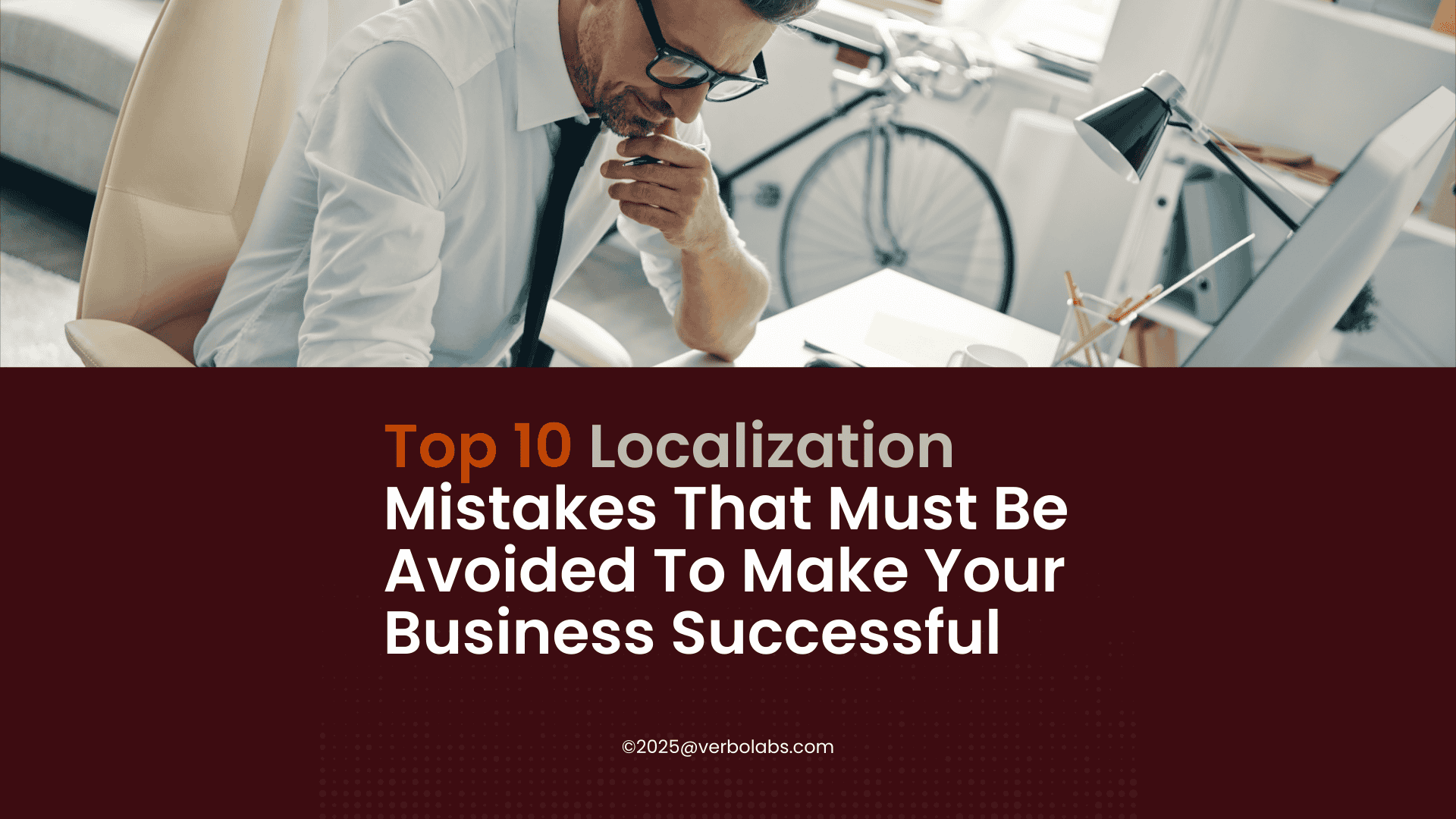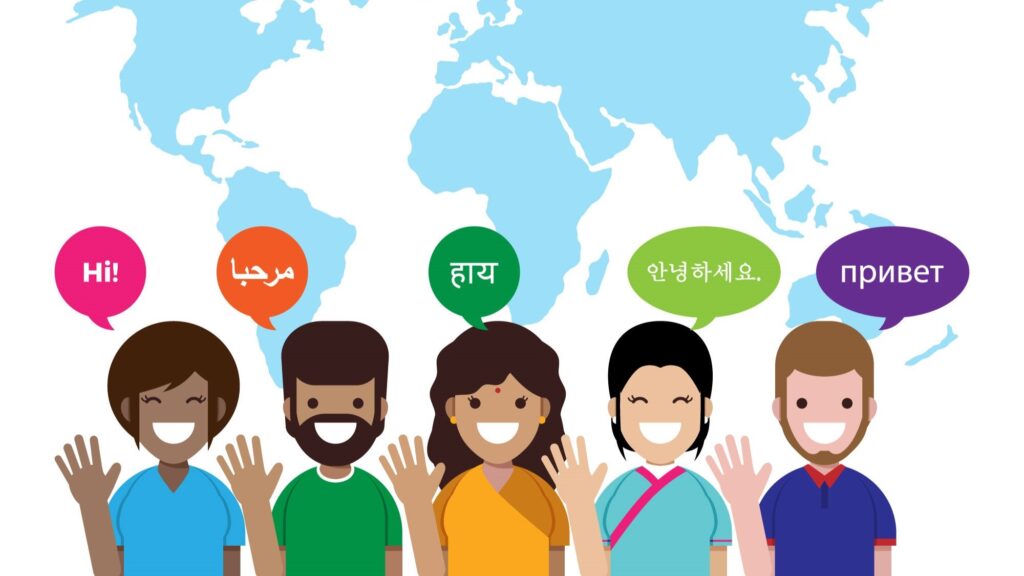
Globalization is no longer optional. By 2025, the global language services market is expected to surpass $80 billion, with localization playing a crucial role in helping companies expand across cultures and borders. A CSA Research survey found that 76% of consumers prefer to buy products with information in their native language. Despite this growing demand, many businesses overlook key localization mistakes to avoid, which can slow down growth, confuse users, or worse—damage brand reputation.
In this blog, we explore the top 10 localization mistakes that can hinder your international success and how VerboLabs ensures your content connects and converts worldwide.
1. Translating Without Localizing
The mistake: Translating content word-for-word without adapting to cultural and contextual nuances.
Example: Pepsi’s tagline “Come alive with the Pepsi generation” was mistranslated in Chinese as “Pepsi brings your ancestors back from the grave.”
Why it matters: Literal translations can misrepresent your brand and alienate local audiences.
How VerboLabs helps:
We provide context-aware localization using native linguists and local market experts, ensuring your brand voice is retained while aligning with local culture.
2. Ignoring Cultural Sensitivity
The mistake: Using culturally inappropriate imagery, phrases, or humor that doesn’t resonate—or worse—offends.
Example: In the Middle East, a fast-food ad showed a thumbs-up sign, not realizing it’s considered rude in certain regions.
Why it matters: Cultural insensitivity can result in PR crises and legal backlash.
How VerboLabs helps:
Our cultural consultants vet content thoroughly to avoid culturally offensive or ineffective elements, ensuring respectful engagement in every market.
3. Not Adapting Design for Localization
The mistake: Creating rigid layouts that break when translated into longer or right-to-left languages.
Example: A U.S. SaaS company’s onboarding UI was unreadable in Arabic because it didn’t support RTL text direction.
Why it matters: Poor UX and broken layouts diminish trust and increase bounce rates.
How VerboLabs helps:
We offer multilingual desktop publishing (DTP) and design advisory services, ensuring that your UI/UX remains visually appealing in all languages.
4. Overlooking International SEO
The mistake: Simply translating keywords rather than optimizing for local search behavior.
Example: A fashion brand targeting Spain translated “sneakers” directly but missed that locals often search for “zapatillas deportivas.”
Why it matters: 60% of Google users click only on the first three search results—missed keywords = missed revenue.
How VerboLabs helps:
Our multilingual SEO specialists research and localize keywords for each market to help your content rank organically in every region.
5. Failing to Localize Legal and Compliance Content
The mistake: Using generalized or untranslated terms in contracts, product disclaimers, or terms of service.
Example: A health app failed to localize medical disclaimers for Germany, resulting in a €10,000 regulatory fine.
Why it matters: Non-compliance can lead to costly lawsuits or banned products.
How VerboLabs helps:
We employ certified translators and legal specialists to ensure your content meets regional laws and terminology standards.
6. Skipping Localization Testing
The mistake: Launching without testing how localized content appears and functions in real-world environments.
Example: A gaming company shipped a Japanese version with mixed-up character names due to string mismanagement—damaging user trust.
Why it matters: Bugs, untranslated strings, and broken pages frustrate users and damage your brand.
How VerboLabs helps:
We offer functional, linguistic, and in-context QA testing to make sure every element performs flawlessly in every language.
7. Using Machine Translation Without Human Review
The mistake: Relying solely on AI-powered tools without proper human validation.
Example: A tech blog’s auto-translated Russian version misused technical terms, confusing readers and hurting credibility.
Why it matters: Inaccuracies reflect poorly on your brand and risk misinformation.
How VerboLabs helps:
We combine advanced CAT tools with human editors to deliver fast yet high-quality translations optimized for clarity and accuracy.
8. Not Planning for Scalability
The mistake: Treating localization as a one-time project rather than part of a long-term strategy.
Example: A startup translated its website into French, but when it expanded to Canada, it had to redo everything due to a lack of planning.
Why it matters: Inconsistent messaging and rework lead to extra costs and time delays.
How VerboLabs helps:
We design scalable localization frameworks with translation memory, term bases, and modular content systems to future-proof your global strategy.
9. Using Non-Experts for Technical Content
The mistake: Let in-house bilingual staff or general translators handle complex industry-specific content.
Example: A biotech firm mistranslated the term “active ingredient” in a regulatory document, delaying product approval.
Why it matters: Industry-specific errors can cost millions or delay go-to-market strategies.
How VerboLabs helps:
We assign domain-expert linguists with backgrounds in law, engineering, healthcare, and technology to ensure accuracy and compliance.
10. Delaying Localization Until After Launch
The mistake: Adding localization only after a product has launched, treating it as an afterthought.
Example: A learning platform launched globally without localizing its UI, resulting in negative reviews and low adoption in non-English markets.
Why it matters: Delayed localization reduces adoption, revenue, and trust.
How VerboLabs helps:
We offer pre-launch localization integration and localization strategy consulting, so you can enter markets stronger and faster.
Why VerboLabs?
With over 120+ languages, ISO 17100 & 9001 certified processes, and a trusted clientele across SaaS, e-commerce, legal, and media sectors, VerboLabs provides localization services designed for global scale and local impact.
We don’t just localize content—we localize strategy, customer experience, and performance.
Final Takeaway
Localization is more than translation—it’s a bridge between your brand and your customers’ world. Understanding the key localization mistakes to avoid can be the difference between a successful global rollout and a cultural misstep. With VerboLabs by your side, you’re not just going global—you’re doing it right.
Ready to scale your business across borders? Let VerboLabs help you localize with confidence. Contact us now.

Avoid Costly Localization Mistakes — Partner with VerboLabs for Accurate, Scalable, and Culturally Relevant Solutions.
Talk to Our Experts Today.
FAQs
Literal translations, ignoring culture, bad UX design, SEO misalignment, and untested content are some of the most frequent mistakes.
We offer native linguists, subject-matter experts, scalable workflows, multilingual SEO, and in-depth testing—ensuring zero compromise on quality.
SaaS, eLearning, gaming, healthcare, fintech, and media companies often see the biggest ROI from strategic localization.
Yes. Our team is equipped to scale quickly and deliver urgent projects with high precision and speed.



